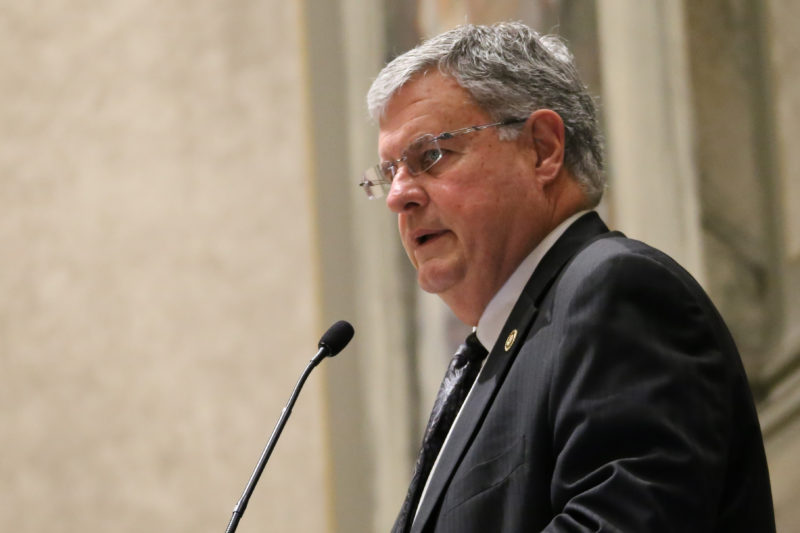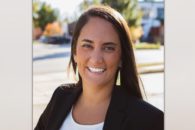Circuit breaker tax credit looks to be most likely solution to budget cuts
JEFFERSON CITY, Mo. – Recent news about budget cuts affecting disabled Missourians has thrown into question whether the Missouri legislature will be returning for another special session this year.
Republican House leaders on Friday announced that, according to information from the Department of Health and Senior Services (DHSS), few Missourians are actually losing services at this time due to the budget reduction, which was estimated to impact roughly 8,000 disabled citizens.
In a release issued by House Speaker Todd Richardson, R-Poplar Bluff, and House Budget Chair Scott Fitzpatrick, R-Shell Knob, they said they had been notified by DHSS that out of the 1,008 people who have been evaluated under the new level of care standards, only 30 have seen altered services.
“Those numbers are pretty astonishing, but there is still going to be a funding problem moving forward and we will need to address this either in a special session or early next session,” Richardson said in a statement.
And while it seems like a significant statistic, Democrats are less than impressed.
“We already knew then about the fewer number of folks affected by the point cut when that promise was made — this is no excuse for failing to move forward,” Rep. Peter Merideth, D-St. Louis, wrote in a Facebook post on Monday.
The news from Republicans comes just a few weeks after Richardson and Senate President Pro Tem Ron Richard tapped Fitzpatrick and Sen. Mike Cunningham, directing the two to form a bipartisan workgroup between the two legislative chambers and find a solution for the estimated $35 million in funding for the Medicaid recipients who were at risk of losing services.
“I am happy that this group came up with several ways to save the money necessary to fund these services and we will move forward with them as soon as the legislature is back in session,” Richardson said.

In a similar statement issued on Friday, Senate President Pro Tem Richard said they believed they had put together a workable solution, and that the Governor’s Office has been made aware of the range of proposals that could restore permanent funding.
“The proposal has been put forward to the governor. We are now waiting on the governor to call us into special session,” Richard said.
The implication here is that, once again, it all rides on the Governor. That, maybe, could be the one thing both parties can agree on.
Budget Chairman Fitzpatrick on Friday stated that the House has “presented multiple solutions to this problem since this budget was passed last session and we will continue to work with our colleagues in both chambers to make a plan to dedicate a revenue stream to fund long-term care for our seniors.”
But what would those solutions be? One solution, it seems, will be the circuit breaker once again.
Several have pointed to the circuit breaker tax credit as the answer, attempting to restore the in-home care cuts by ending the tax credit for low-income seniors who rent homes.

According to the St. Louis Post-Dispatch, Cunningham met with Gov. Greitens to discuss a plan to restore the $35 million, one that would seek to generate money by limiting the number of elderly renters. Under the plan, those earning more than $22,000 will no longer qualify for the credit.
Democrats, however, are once again not impressed.
That’s because it’s not the first time they’ve seen it. The House attempted to restore the cuts through the circuit breaker this past session, but Democratic resistance in the Senate quashed that plan, and instead passed HCB 3, a bill seeking to sweep $35 million in funds from other areas to avoid the cuts to the in-home care program.
Following the last-minute passage of HCB 3, it was left to Governor Eric Greitens to either sign the bill or veto it. He chose the latter, calling the bill a ‘budget gimmick’ and saying it was “an unconstitutional, one-time, fake fix to a real problem.”
Since then, lawmakers have continued discussing the matter, with Democrats calling for a special session to fix the issue throughout the entire summer and into veto session. During veto session, only 49 of the House’s 163 members voted to override the Governor’s veto, eliminating that option as a way to fix it, and ensuring that the only way to return to the matter would be through a special session.
Following the failed veto override, Republicans spoke of an informal timeline of three weeks to give a task force time to come up with solutions, but weeks later, no session has been called. Democrats continue to ask the basic questions of who will call for a special session, when will it be called, what will the fix be, and why is it taking so long?
The perceived lack of urgency from Republicans has exasperated their more liberal counterparts, but it has done little else in terms of weakening their resolve to discuss the issue. They say there’s too much at stake, and the clock is ticking.
“Every day we wait, seniors go without prescription coverage, more folks lose services they have now, quality of care goes down with less to pay for it each day, and disabled folks go with a 40% cut to their care. Every day that we wait is a day that they’re suffering.”
The concern of Republicans at this point is whether a bill can get passed through both chambers. Fitzpatrick says they’ve outlined several options that he believes the House would approve of, and Cunningham has taken them to the Governor’s Office.

“If the Governor can be convinced to call a special session and the Senate has a version of that bill they can get out of that body, then the House is ready to go to work and get something done to address the issue,” Fitzpatrick said.
If the matter is waiting for the Governor to call for a special session, Merideth says maybe their best option is to find other alternatives to get the Governor’s attention.
“Maybe we need to find some Iowans to call him and push for it. He might care more about their opinions than ours,” he said, noting the Governor’s absence in recent weeks.
Instead, the St. Louis Democrat says the legislature should take matters into their own hands and address an issue that is the Governor’s own making.
“Why aren’t we calling ourselves back to a special session and voting on them?” Merideth asked. “If Republicans thought it was worthwhile to spend money for a special session for restrictions on Planned Parenthood that are probably unconstitutional, and on a potential job creator from which we’ve seen zero jobs created, then how can we not agree that it is worth going to a special session to fix these horrible cuts for our seniors?”
If a legislative special session is the only option left, then Fitzpatrick says the most likely scenario to that path would begin with the Senate collecting the necessary signatures.
“If the Senate feels like they have the ability to get the signatures, and they go and get them, then I think the House would be willing to make the effort to get those signatures as well,” Fitzpatrick said. “Logistically speaking, it’s a lot easier to find out whether 24 people are going to sign a piece of paper instead of 123, so I think we’d be more inclined to let them go first. But I think the more clean way to get to a special session is for the Governor to be given the level of assurances and comfort that he needs to see that things will go the way they need to go so that he can call it.”

Both Merideth and Fitzpatrick note that every legislator seems to want a fix, the only issue seems to be differences in how they believe it should be fixed.
Both sides have ideas of how to find the funding, and to that end, Merideth says they need to come back and have those conversations in an open and transparent way and work together to find the right answers that both sides can agree on.
And to do that, the Democrats need the Republicans.
“We need the Republican caucus to do it, and we need them to own it,” Merideth said.
But as the days continue to pass with no action, it seems more likely that a special session will not be called, and the next chance to discuss it will be the 2018 legislative session. Merideth says that, if that’s how this plays out, Democrats are more than ready, with legislation ready to be filed in December.
“By the time we get to January, we’ve missed half of the time in which they needed the care,” he said. “We could wait until the regular session because we’re not the ones being affected.”
Benjamin Peters was a reporter for The Missouri Times and Missouri Times Magazine and also produced the #MoLeg Podcast. He joined The Missouri Times in 2016 after working as a sports editor and TV news producer in mid-Missouri. Benjamin is a graduate of Missouri State University in Springfield.



















